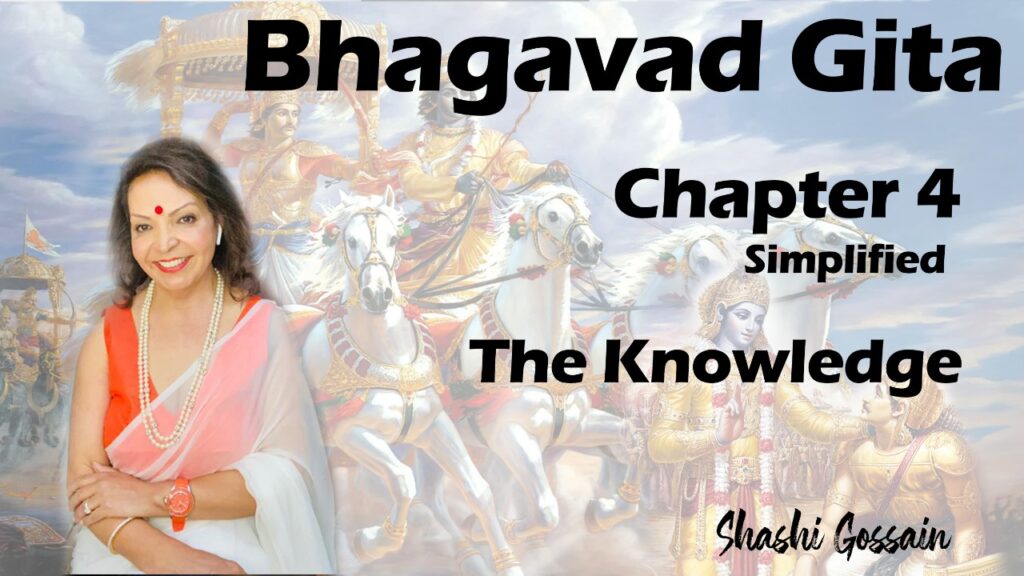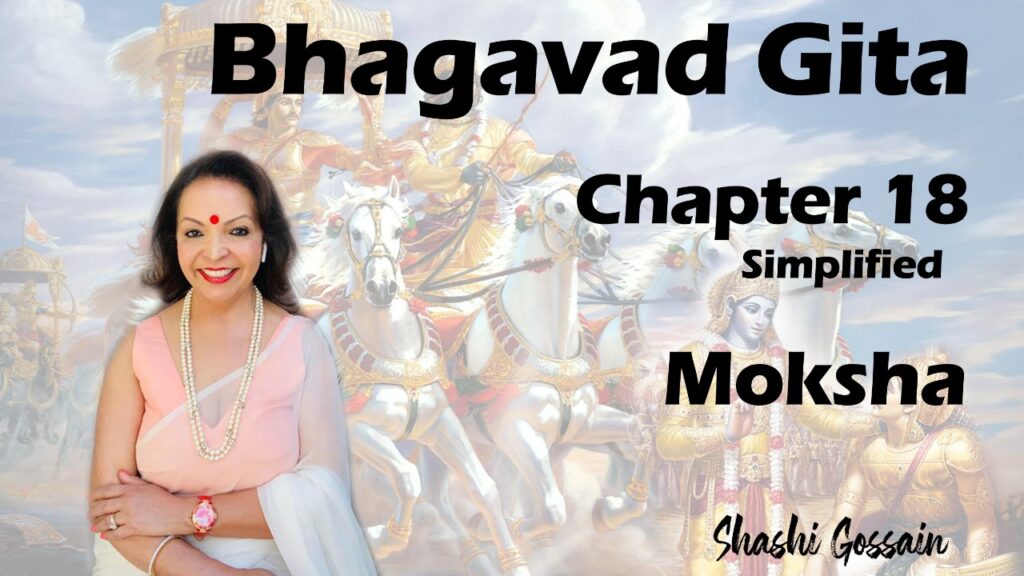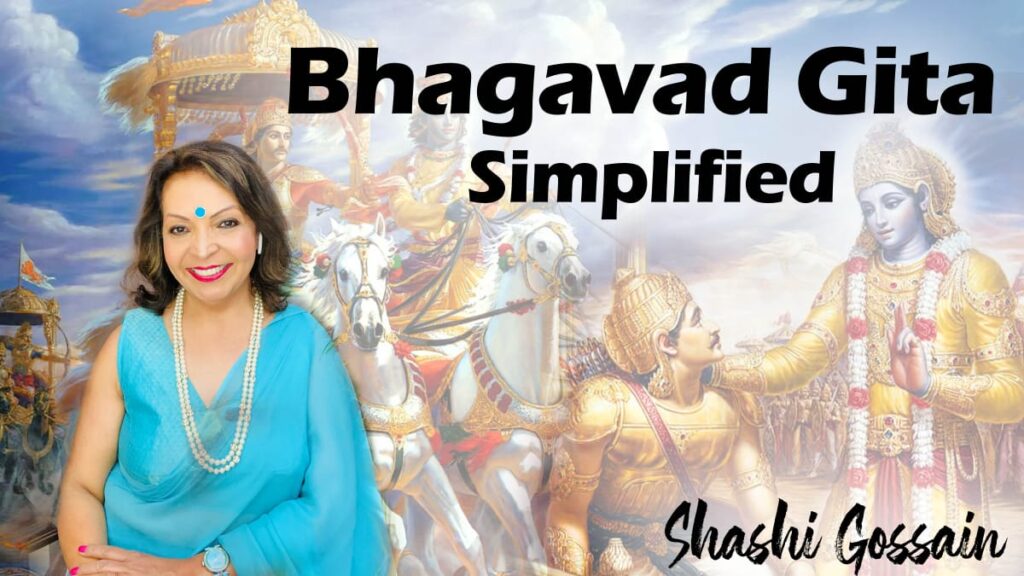The journey from the first chapter of Gita to the fourth chapter is one of elevated levels of integrating or tuning our thought processes. In Geeta’s first chapter, we are at the level of selfish action, where we see gain and loss in everything we do.
As we move into the second and third chapters, we are introduced to the concept of desire-less action. Here, we slowly give up attachment to the result of our action by dedicating it to a higher ideal.
Where did Bhagavad Gita originate? Who had the knowledge of Geeta before Arjun?
Shri Krishna opens the 4th chapter by giving the ultimate knowledge of Shrimad Bhagvat Geeta. He says this divine knowledge was first given to Viivasvaan, the sun. The sun was the first karmayogi, who works selflessly to provide light to the world, without getting tired.
The sun then gave this knowledge to Manu, who is considered to be the first human being from whom all humans originated, like Adam in the Bible. Hence humans are called manu-shya. Manu gave to Ikshvaaku, the fist king in the solar dynasty or Soorya vansh. All these kings were kshatriyas or warriors. Shri Krishna highlights this point in order to make Arjuna, a warrior himself, better appreciate the teaching.
So, Shri Krishna says that cosmic intelligence is the origin of this knowledge. This illustrates a beautiful aspect of the hinduism: no one person claims authorship of spiritual knowledge.
Shri Krishna says that even though this knowledge was prevalent in ancient times, it became distorted due to the long passage of time, as it was passed by word of mouth, from generation to generation. Therefore, now and then someone has to come to refresh the original message of the Gita, and that is what Shri Krishna is doing now.
What did Krishna told Arjuna in Bhagavad Gita?
Shri Krishna needs to communicate Geeta to the right person so that the message is properly understood.
Shri Krishna very affectionately tells Arjuna that he regards him as a devotee and a friend, and finds him fit and capable to receive this supreme knowledge. Arjuna was of course quite happy to receive it, but why was he chosen?
Whoever received this knowledge needed to be capable of communicating it to others. It was not enough that this person was wise.
Shri Krishna also needed a capable evangelist, one who had a mix of sattva and rajas, in order to both understand and spread this knowledge. A brahmana is predominantly saattvic by nature, and may not have been able to communicate and establish this knowledge in the world. Therefore Shri Krishna revealed this knowledge to Arjuna, the ultimate kshatriya warrior.
Moreover, Arjuna was Shri Krishna’s devotee and friend. He had the best rapport with Shri Krishna, as well as profound reverence for him. So much so that Arjuna confided his fears to him in the first chapter, something that a kshatriya would hesitate to do. Arjuna also had the courage to express any doubts without fear of reprimand, and in doing so, get a clear understanding of the teaching.
What does the Bhagavad Gita say about reincarnation? Is it possible to learn before birth?
Arjuna asked Krishnaji of how he could have imparted the knowledge to the sun, when the sun has been there much longer than him?
Krishnaji replies, that both Arjuna & he have taken many births in the past, but us mortals, forget our prior births & Krishnaji doesn’t.
Normally, human beings have such strong identification with their body that it restricts their ability to remember what occurred in another body. We even tend to forget events associated with our own body with the passage of time, including simple things like where we left our keys in the morning. Krishnaji is not restricted by these limitations.
Here Krishnaji reveals himself as the Ishvara, the God. He can control nature, prakriti, which is made up of the 3 gunaas, through a power called maya. The intelligence of Ishvara can be seen in the harmony of the universe, when we see the vast cosmos with stars, planets, the sun and so on.
Our Puraanic literature describes several avataaras in great detail, but these are only a subset of the countless avataaras that take place over time.
What is the purpose of Krishna avatar?
Shri Krishna says, “Whenever there is decay in dharma or harmony, and a rise in adharma, or unrighteousness, I shall manifest to bring back harmony. This happens at every crisis time and time again.” For the:
- protection of good people
- destruction of evil people
- establishment of dharma
How do you do Karma Yoga?
Krishnaji again re-iterates that we have to detach ourselves & become karm yogis, for which, there are 3 stages:
- shravana (hearing the scriptures)
- manana (contemplating)
- nidhidhyaasana (internalization)
Why are deities important in Hinduism?
It is here that Krishnaji says that there is one supreme power, but deities are created for humans to channel their concentration upon an object.
What are the three Gunas of Prakriti?
Shri Krishna has mentioned 4 classes in Gita, so that we could perform our duties, or svadharma effectively. The classes are based on the 3 gunaas, with corresponding expressed actions:
- Sattva: knowledge and peace
- Rajas: activity or agitation
- Tamas: lethargy, in need of motivation
So we have to perform self-analysis in order to understand how the gunaas (mind-set) behave within us and in what proportion to each other. We will fall into one of these four categories-
- A brahmana who is predisposed to gaining knowledge, faith, sharing knowledge will usually have a prominence of sattva.
- A kshatriya who demonstrates courage, likes to organize and protect people, face challenges, take risks, try new things will have a prominence of sattva and rajas.
- A vaishya who likes to be creative and produce something will have a prominence of rajas and tamas.
- A shudra who likes to execute tasks but requires direction & motivation will have prominence of tamas.
There’s an incorrect notion that varna is determined by birth.
Bhagavad Gita offered a scientific manner of selecting a career that is suitable for oneself both from a practical perspective, and also from a karma yoga perspective.
We all play different parts in a cosmic play. Each part is different based on our own svadharma.
What is self realization in Bhagavad Gita?
Krishnaji tells Arjuna that ancient rishis knew the meaning of “I”, as actions carried out selflessly to the eternal essence & did not need to retire to a forest to find it.
They performed their normal duties as a karma yogi.
We can achieve self-realization through performance of action, & not have to renounce everything.
What is action and inaction?
Shri Krishna has described the nature of action of a man with knowledge.
The lord defines a wise man that sees actionlessness amongst the body activities.
This is inaction in action.
An example would be of a hard-working that can do tough tasks without getting fed up, as against a lazy man.
Next he defines “action in inaction”. This is of a man with an ego, who thinks he is the doer of all tasks & takes self-credit, without recognising the eternal essence or the prakriti or nature around him.
Shree Krishna goes on to say that the person who constantly discriminates to eliminate all sense of doership will accomplish any task that he undertakes without fail.
What does Krishna say about work?
Shri Krishna says that if we treat all actions of work like performing a yajna, all our goals will be achieved & we will begin to experience the eternal essence.
Krishnaji goes on to say you have detached yourself & burn your selfish desires with the fire of knowledge.
An example is a bitter medicine that will cure you, your intellect knows that.
But the sense of taste did not like it, which is a selfish desire.
He wants our intellect to guide us in our svadharma, and stop our mind from labelling objects good or bad.
Therefore, we should remain alert at all times, and should reinstate the supremacy of the intellect over the senses whenever the senses move towards external objects.
Another example is if you have a project to do, you may start enthusiastically & have a plan, but if you get distracted, that project would flop. This means that your senses took over your intellect.
What is happiness by Krishna?
As we grow up, we are programmed and conditioned by the world to believe that happiness is something that is outside of us. This conditioning goes deep inside our psyche and causes us to run after a better job, more money, a bigger house and so on.
If one follows svadharma sincerely, wealth will come naturally as a result. But constant seeking of happiness from external objects makes us slavishly dependent upon the world, making us restless. Because any happiness gained from the material world will be finite and temporary.
Krishnaji says if we apply yajna spirit principle in all our daily activities, it will lead to internal happiness.
As humans, we perform selfish actions as a result of an unhealthy relationship with the world.
Each selfish action generates a negative reaction from the world which accumulates as karma.
The way out of this predicament is the correct knowledge. This is a healthy relationship with the world where all traces of selfishness are gone, and one works in a spirit of yajna.
What are the ways of knowledge in Hinduism?
Humans’ mind is always racing with thoughts and anxieties about the future.
Shri Krishna gives us many ways of attaining self-knowledge, depending on the maturity of the individual.
- Worship of deities. Most humans find it difficult to comprehend a formless brahman, therefore deities were created, through which they invoke Ishwara. Pooja is done to connect with God through the image.
- Meditation: some people prefer to realize the formless brahman through contemplation.
-
Yajna: sacrificial fire ritual.
Symbolically, self-control; is like the fire, to which the senses are offered. We use discretion over what we see, eat or hear.
This withdrawal of energy from the senses is called pratyaahara. -
Sacrifice: advanced yogis sacrifice the notion that they live in a world of objects.
They imagine the whole universe as a configuration of the 3 cosmic energies, and that they only form a fraction of that energy. - Praanas: even more advanced yogi can restrain the life forces or praanas within our body & attain stillness.
- He then withdraws attention from senses & from the praanas, and redirects the energy towards concentration or dhyaana on the eternal essence, leading to sammadhi.
Lord Krishna gives us 4 further yajnas:
- Charity, by giving time or wealth. This should be done selflessly, without a view for publicity.
- Austerity or tapas: selfless seva, service to the world.
- Spiritual practice or bhakti-yoga
- Study of scriptures. Daily readings of any spiritual books e.g. The Ramayana or Gita, with utmost concentration & understanding.
- Praanaayam: mindful inhaling & exhaling quietens the mind.
- Fasting: restricting food intake, and offering the first morsel to a deity.
By controlling food intake, we can control our mind. By offering this sense to the universe, we acknowledge that we are not the owner of senses.
Krishnaji urges us to implement at least one of these yajnas in our daily life, as it will give us an inner joy, called “amrita”, which has the power of negating all our sorrows.
How will yajnas, born out of finite action, make us obtain the infinite eternal essence?
Performance of yajna is a preparatory step towards realization.
Realization will happen when we gain the eternal knowledge, that we are not the doer or “I”, but part of the infinite.
Shri Krishna says that we should begin by approaching a teacher who has two key qualities:
- He should have realized the eternal essence himself.
- He knows the technique of communicating this knowledge.
And we ourselves should have a thirst for knowledge & be willing to learn with humility.
The whole point is that we should realise that we are in tune with all in nature & see the divine in all living matter.
Shri Krishna gives a wonderful analogy:
We can cross over the river of all our sins with the boat of knowledge, meaning, this knowledge has the power of destroying all our sins completely.
The teacher is no doubt needed to guide us in the right direction, but it is our own effort, focus and motivation that will help us get the knowledge.
True knowledge always comes from within us, & will come when we are ready.
Shri Krishna, points out that in addition to the focus & sense control, we need faith, or shraddha. Faith in:
- scriptures
- teacher
- ourselves
- truth of the eternal essence
And be convinced that there’s something beyond the material world. Above all, we need restraint & control over the senses.
If sense restraint is absent, then our attention would quickly stray away from the spiritual path into the material world.
Knowledge of self-realization annihilates the ego, which eliminates the ego’s noise, giving us everlasting peace. Ultimately, we are all seeking peace, which is beyond happiness.
Actions continue to happen.
One who has attained the knowledge of self-realization acts without a sense of doership of action or enjoyer of results.
One who has gained knowledge of own self & dispelled all doubts is called “aatmavant”.
When we are operating at the level of a karmayogi, we express our desires through performing actions, but dedicate all the results to Ishvara.
In this concluding verse of the fourth chapter, Shri Krishna urges Arjuna to cast away all his doubts and get back to fighting the Kurukshetra war. In other words, he asks the students of the Gita to put the teaching of the fourth chapter into practice, and to act in this world.




Hi, What is the best free software to automatically backup wordpress database and files ? A software that is trustworthy and would not hack your password in wordpress. Have you tried it ? For How long ? Thanks……